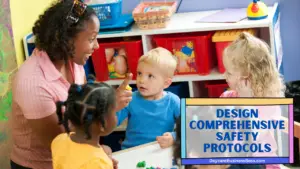Starting a licensed childcare is a satisfying and important endeavor. As a prospective daycare provider, you have the unique opportunity to establish a supportive atmosphere in which children may learn, play, and grow while also offering important assistance to parents and caregivers. However, this business necessitates careful planning, respect for rules, and a dedication to safety and excellence.
To start a licensed daycare, you should research your jurisdiction’s regulations, create a detailed business plan, secure appropriate facilities, design safety protocols, hire trained staff, and undergo required inspections. Obtain necessary licenses and permits before opening.
In this article, we will walk you through the main stages and concerns involved in opening a licensed daycare. Whether you’re motivated by a love of children or a desire to make a difference in your community, this book will help you convert your daycare dream into an effective and fulfilling reality.
Research Jurisdiction’s Regulations

Setting up a daycare is a promising venture, but before you take the plunge, it is critical to research the extensive arena of regulations and licensing requirements imposed by the area in which you operate. These rules serve as the foundation for creating a safe and suitable environment for children.
Comprehensive knowledge of these regulations is required, as they cover a wide range of important topics. These standards include factors like as staff-to-child ratios, health and safety norms, curriculum instructions, thorough background checks for staff members, and other vital components.
To properly navigate this regulatory landscape, consult with your local regulatory authority or licensing agency. This engagement acts as an invaluable compass, leading you through the subtleties of what is expected and required in your daycare operation.
Adhering to these regulations is more than just a checkbox exercise; it is the foundation for guaranteeing the safety and holistic development of the children under your care. It also contributes to the growth of your daycare enterprise. A firm adherence to these laws assures parents and guardians that their children are in capable and caring hands.
Read more about: Insightful Foundations: The Cornerstone of Baby Daycare Market Research
Craft a Detailed Business Plan
Creating a thoroughly structured business plan is a critical step toward growing a thriving daycare service. This roadmap for achievement acts as a compass, guiding the course of your business toward prosperous vistas. Throughout this extensive book, numerous parts come together to form a holistic approach that covers every aspect of your daycare’s existence.
The articulation of your daycare’s mission is at the heart of this approach. This statement expresses the ethos, values, and overarching purpose that will govern all operations and interactions. Defining your target demographic at the same time unravels the fabric of your possible audience, rooting your efforts in a clear grasp of the community you wish to serve.
In-depth, your business strategy will outline the dimensions of your educational approach. This educational framework outlines the procedures, disciplines, and pedagogical philosophies that will mold the young brains in your care. Your marketing plans will outline the channels via which you will communicate the distinctive offerings of your daycare to parents and guardians.
Budget estimates, which anchor your business plan in financial soil, show the financial course your endeavor is prepared to take. These projections not only help to secure money, but they also serve as a road map for financial management, assuring long-term growth.
Operational plans are the sinews that hold your company together. They include the logistics, personnel strategies, day-to-day procedures, and contingency plans that turn your vision into a set of tangible tasks.
This detailed plan does more than just outline a vision; it strengthens the foundation of your childcare with realism. It becomes the foundation upon which educated decisions are made, milestones are met, and unexpected problems are overcome. This living contract helps secure the required financial backing, builds trust among stakeholders, and instills order in the otherwise complex process of childcare creation.
Secure Appropriate Facilities
The process of choosing the best physical place for your childcare enterprise emerges as a critical decision that establishes the groundwork for its overall growth. An intricate web of elements converges within this choice, each with a substantial impact on the quality of care and overall experience provided to the children under your guardianship.
Accessibility for parents and guardians is determined by location, which is an important aspect. A handy location not only facilitates drop-offs and pick-ups but also develops a sense of community. Safety comes first, as the chosen space must be devoid of risks and meet high safety regulations. This includes things like structure stability, fire safety precautions, and well-kept play spaces.
Accessibility includes not only ease of entry and leave but also compliance with requirements to accommodate disabled children. The layout of the chosen facility should be suitable to the different needs of children, employees, and parents.
The physical arrangement should be proportionate to fit the activities and exploration of the youngsters. Both indoor and outdoor spaces should be large enough to allow for play, learning, and rest. To ensure the safety of every child in your care, these locations must be thoroughly childproofed.
Modifications or renovations may be required in some circumstances to match the space with safety regulations and the demands of a nurturing environment. Zoning restrictions must be followed since certain locations may be designated for specific activities or have occupancy limits. Ensuring that your chosen facility complies with these laws not only avoids legal difficulties but also contributes to your daycare’s general reputation and professionalism.
Creating a loving and stimulating environment for children has a significant impact on their growth, development, and general happiness. Thoughtful interior design, age-appropriate furnishings, and interesting instructional materials all help to create a setting that promotes holistic learning.
Design Comprehensive Safety Protocols

The primary concern in childcare operations is the safety and well-being of the children entrusted to your care. Creating a haven necessitates the thorough formulation and consistent implementation of comprehensive safety rules that cover a wide range of essential areas.
The most important of these protocols are the emergency procedures, which have been methodically designed to deal with any unforeseen disaster. These protocols, which range from fire drills to evacuation plans, are the safety nets that enable rapid and orderly actions, reducing possible injury in times of crisis. Sanitation procedures are critical in maintaining a sanitary environment that protects children from illness. In this area, strict cleaning procedures, proper waste disposal, and sanitization methods are all required.
Health protocols serve as a barrier against communicable diseases. Adherence to established immunization schedules, regular health check-ups, and early isolation of sick children all help to keep a contagion-free environment. Transportation guidelines promote children’s safe journeys by specifying procedures to safeguard their safety throughout commutes.
The standards’ protective hug extends to food safety as well. Potential allergies and illnesses can be avoided by thoroughly verifying food sources, using suitable storage and preparation methods, and accommodating dietary requirements.
With the application of these safety standards, the daycare environment is elevated to a level of unrivaled security. This protected environment allays the fears of parents who commit their precious children to your care. It demonstrates your steadfast dedication to their well-being.
Aside from the obvious advantages, these guidelines foster a culture of vigilance, responsibility, and preparedness among your employees. In turn, this culture pervades all aspects of your daycare’s operations, establishing it as a model of safety and reliability.
Read more about: Safe and Sound: Mastering Daycare Safety and Sanitation with This Checklist
Hire and Train Qualified Staff
The selection of an adept and passionate staff emerges as a cornerstone aspect in the intricate fabric of daycare administration. This thorough selection of personnel who will be entrusted with the development of young brains is a critical duty that has a significant impact on the quality of care given.
The hunt for new employees should go beyond simply looking for people with relevant skills and a natural desire to work with youngsters. This enthusiasm fires meaningful connections and fosters an environment rich in empathy and understanding. It is the foundation for the children’s development and enjoyment.
However, passion must be balanced with caution. Thorough background checks are a non-negotiable need to protect the children’s safety and security. These checks uncover any potential red flags, ensuring that only those of the highest integrity and suitability are admitted.
However, the journey does not end with choosing; it continues with ongoing learning and improvement. Providing your employees with essential training demonstrates your dedication to the overall development of the children. This training covers a wide range of topics, including child development to understand each child’s unique needs, first aid, and CPR to deal with emergencies, behavior management to navigate challenges, and effective communication to foster meaningful connections with both the children and their parents.
A well-trained staff is more than a group of professional individuals; it is a cohesive team that works together to protect the children’s well-being. Their expertise is felt in all elements of childcare operations, from physical safety to emotional development. A pleasant childcare experience is inextricably linked to the presence of personnel who exude professionalism, friendliness, and skill.
Undergo Required Inspections
Regulatory inspections are critical in maintaining safety and quality requirements in the complex environment of childcare administration. Most jurisdictions need these inspections, which cast a critical eye over various aspects of your childcare operation, ranging from the physical to the human. Navigating these inspections is an important step in ensuring the safety of the children and the credibility of your establishment.
These inspections cover a wide range of topics, including a thorough examination of the physical environment, staff credentials, safety protocols, and regulatory compliance. The physical environment must be safe, favorable to learning, and sanitary. Staff qualifications are evaluated to ensure that those entrusted with the care of children have the necessary expertise. Safety protocols are scrutinized to ensure readiness for any situation, while regulatory compliance demonstrates your dedication to operational excellence.
Preparing for these inspections is more than just a formality; it is a strategic endeavor. A complete examination of your facility and operations is required, analyzing every aspect to verify compliance with the relevant requirements. This includes reviewing employee qualifications, analyzing the physical layout for safety, validating the robustness of safety systems, and assuring strict conformity with rules.
It is critical to address any flaws raised throughout the review. Prompt action to correct any inadequacies or anomalies not only improves the quality of your daycare but also shows inspectors that you are proactive. Timely restoration demonstrates your commitment to providing a safe and caring environment for the children.
Managing inspections is more than just a regulatory necessity; it represents your dedication to quality. A positive inspection outcome reinforces the faith that parents and guardians place in your care, as well as your commitment to maintaining the highest standards. It gives them peace of mind that their children are being cared for in a setting that prioritizes their safety, development, and happiness.
Obtain Necessary Licenses and Permits

Licensing is an essential legal cornerstone for running a daycare, establishing an unshakeable basis of compliance and accountability. The complex web of regulations and norms woven into the childcare landscape necessitates a rigorous approach to licensing, which differs depending on the specific requirements of your country.
Licenses and permits are a multidimensional spectrum within this legal framework, each playing a critical part in legitimizing your daycare company. These may include a business license, a daycare license, a health department permission, and maybe other endorsements customized to the requirements of your location. Effectively navigating this landscape demands a grasp of the nuances specific to your area.
The application process for these licenses frequently requires more than just filling out papers. It may entail a thorough examination of your credentials as well as the suitability of your facility to create a secure and enriching environment for children. This could include submitting documentation like business strategies, health and safety policies, and compliance records. Background checks for employees and, in some cases, interviews may also be part of the procedure.
Obtaining these licenses demonstrates your dedication to upholding the greatest childcare standards. It’s a proactive action that reassures parents and guardians that their children are safe. The rigorous approach to getting your paperwork in shape and swiftly addressing any stated criteria indicates your attention to professionalism and readiness to comply with regulatory authorities’ recommendations.
A well-executed licensing process is more than just a legal necessity; it’s a badge of authenticity that distinguishes your daycare as a respected and trustworthy facility. It speaks volumes about your willingness to go above and beyond to assure the safety, well-being, and holistic development of the children.
Read more about: Pioneering Childcare: Crafting a Daycare Business Plan Outline
Frequently Asked Questions

What are the most important regulations to consider when opening a licensed daycare?
Starting a licensed daycare requires you to follow several regulations to protect the safety and well-being of the children in your care. employees-to-child ratios, health and safety standards, background checks for employees, curriculum guidelines, and other issues may be covered by these regulations. To maintain compliance and establish a safe atmosphere for children, it is critical to investigate and understand the precise laws set by your jurisdiction’s licensing authority.
How vital is a thorough business plan for a new daycare?
A detailed business strategy is essential for a daycare startup. Your daycare’s objective, target population, educational approach, marketing strategy, budget estimates, and operational plans are all outlined in a business plan. It acts as a road plan for your daycare’s expansion, assists in securing funds, supports decision-making, and keeps you organized during the setup process. A well-structured business plan boosts your chances of growth and reflects your dedication to running a professional and well-planned childcare.
What stages are involved in hiring and training daycare staff?
Hiring and training qualified employees is an important component of running a daycare. Begin by looking for people with relevant experience and a genuine interest in working with children. Conduct extensive background checks and provide child development, first aid, CPR, behavior management, and communication training. A well-trained staff contributes to the well-being of the children and creates a great childcare experience. Investing in staff training shows your dedication to providing a secure and caring environment for the children in your care.
To learn more on how to start your own daycare checkout my startup documents here.
The information provided by DaycareBusinessBoss.com (“The Site”) is for general informational purposes only. All information on the Site is provided in good faith, however, we make no representation or warranty of any kind, express or implied, regarding the accuracy, adequacy, validity, reliability, availability or completeness of any information on the Site. Under no circumstance shall we have any liability to you for any loss or damage of any kind incurred as a result of the use of the Site or Reliance on any information provided on the Site. Your use of the Site and your reliance on any information on the Site is solely at your own risk.
This blog post is for educational purposes only and does not constitute legal advice. Please consult a legal expert to address your specific needs. Terms and Conditions. (https://daycarebusinessboss.com/terms-conditions/)

Meet Shawn Chun: Entrepreneur and Childcare Business Fan.
I’m a happy individual who happens to be an entrepreneur. I have owned several types of businesses in my life from a coffee shop to an import and export business to an online review business plus a few more and now I create online daycare business resources for those interested in starting new ventures. It’s demanding work but I love it. I do it for those passionate about their business and their goals. That’s why when I meet a childcare business owner, I see myself. I know how hard the struggle is to retain clients, find good employees and keep the business growing all while trying to stay competitive.
That’s why I created Daycare Business Boss: I want to help childcare business owners like you build a thriving business that brings you endless joy and supports your ideal lifestyle.


